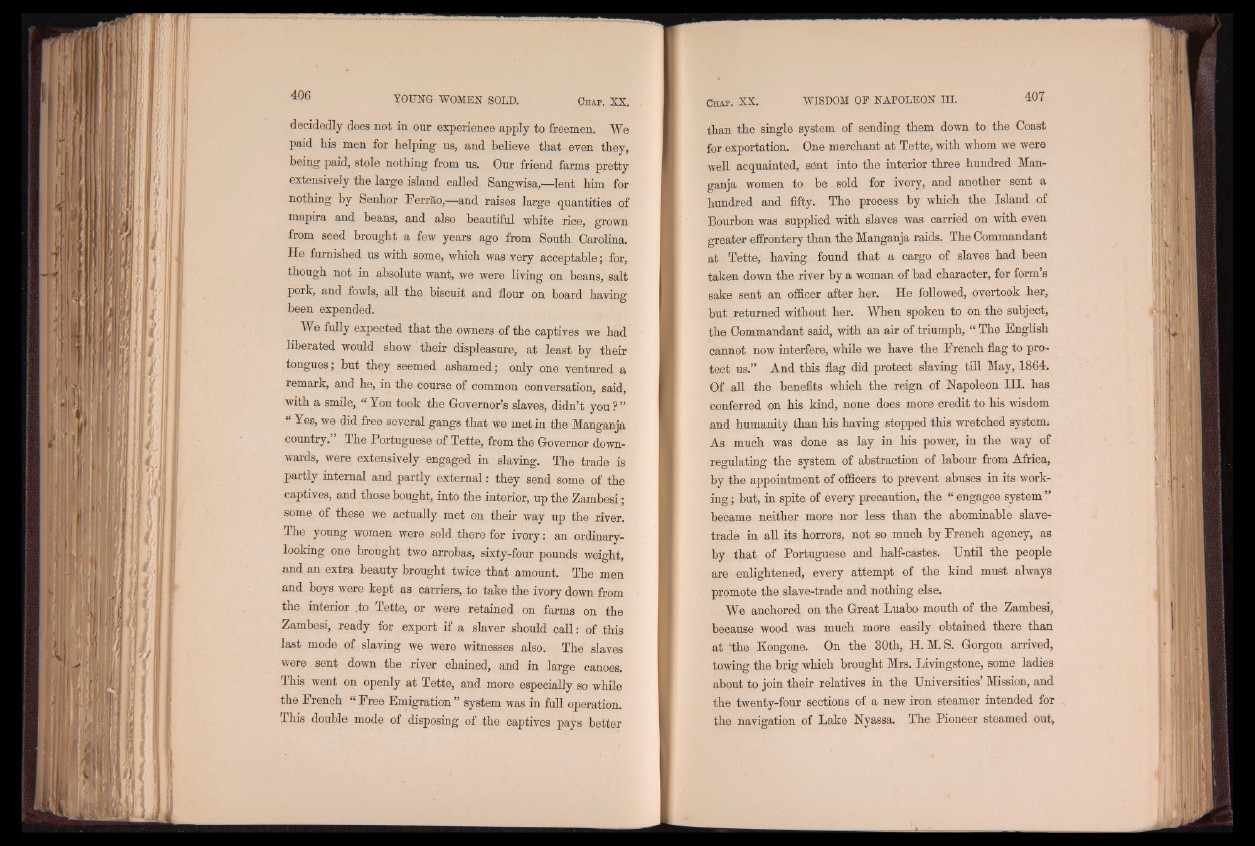
decidedly does not in our experience apply to freemen. We
paid his men for helping us, and believe that even they,
being paid, stole nothing from us. Our friend farms pretty
extensively the large island called Sangwisa,—lent him for
nothing by Senhor Ferrao,—and raises large quantities of
mapira and beans, and also beautiful white rice, grown
from seed brought a few years ago from South Carolina.
He furnished us with some, which was very acceptable; for,
though not in absolute want, we were living on beans, salt
pork, and fowls, all the biscuit and flour on board having
been expended.
We fully expected that the owners of the captives we had
liberated would show their displeasure, at least by their
tongues; but they seemed ashamed; only one ventured a
remark, and he, in the course of common conversation, said,
with a smile, “ You took the Governor’s slaves, didn’t you ? ”
Yes, we did free several gangs that we met in the Manganja
country.” The Portuguese of Tette, from the Governor downwards,
were extensively engaged in slaving. The trade is
partly internal and partly external: they send some of the
captives, and those bought, into the interior, up the Zambesi;
some of these we actually met on their way up the river.
The young women were sold therefor ivory: an ordinary-
looking one brought two arrobas, sixty-four pounds weight,
and an extra beauty brought twice that amount. The men
and boys were kept as carriers, to take the ivory down from
the interior .to Tette, or were retained on farms on the
Zambesi, ready for export if a slaver should call: of this
last mode of slaving we were witnesses also. The slaves
were sent down the river chained, and in large canoes.
This went on openly at Tette, and more especially so while
the French “ Free Emigration ” system was in full operation.
This double mode of disposing of the captives pays better
than the single system of sending them down to the Coast
for exportation. One merchant at Tette, with whom we were
well acquainted, sent into the interior three hundred Manganja
women to be sold for ivory, and another sent a
hundred and fifty. The process by which the Island of
Bourbon was supplied with slaves was carried on with even
greater effrontery than the Manganja raids. The Commandant
at Tette, having found that a cargo of slaves had been
taken down the river by a woman of bad character, for form’s
sake sent an officer after her. He followed, overtook her,
but returned without her. When spoken to on the subject,
the Commandant said, with an air of triumph, “ The English
cannot now interfere, while we have the French flag to protect
us.” And this flag did protect slaving till May, 1864.
Of all the benefits which the reign of Napoleon III. has
conferred on his kind, none does more credit to his wisdom
and humanity than his having stopped this wretched system.
As much was done as lay in his power, in the way of
regulating the system of abstraction of labour from Africa,
by the appointment of officers to prevent abuses in its working
; but, in spite of every precaution, the “ engagee system ”
became neither more nor less than the abominable slave-
trade in all its horrors, not so much by French agency, as
by that of Portuguese and half-castes. Until the people
are enlightened, every attempt of the kind must always
promote the slave-trade and nothing else.
We anchored on the Great Luabo mouth of the Zambesi,
because wood was much more easily obtained there than
at 'the Kongone. On the 30th, H. M. S. Gorgon arrived,
towing the brig which brought Mrs. Livingstone, some ladies
about to join their relatives in the Universities’ Mission, and
the twenty-four sections of a new iron steamer intended for
the navigation of Lake Nyassa. The Pioneer steamed out,